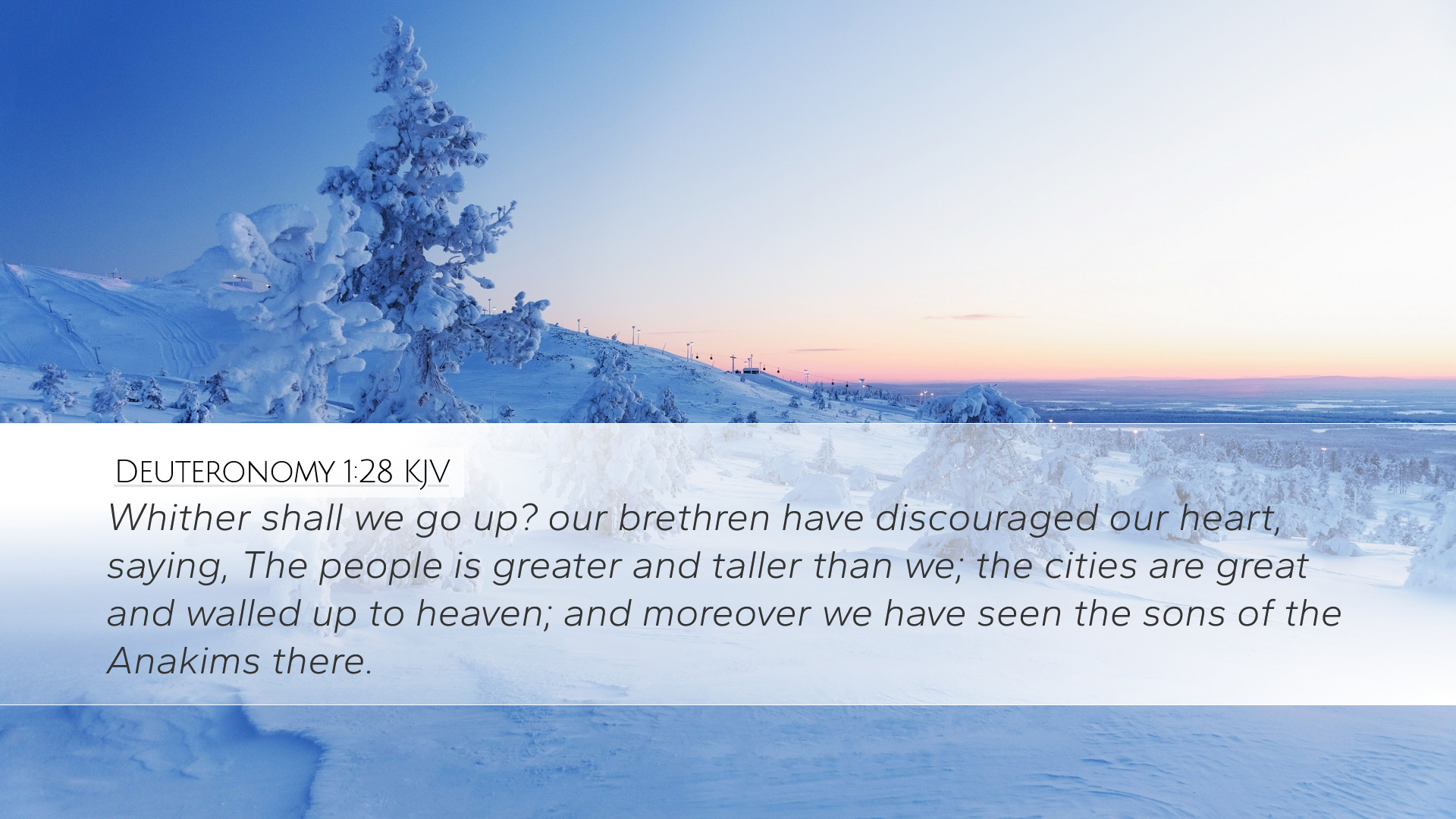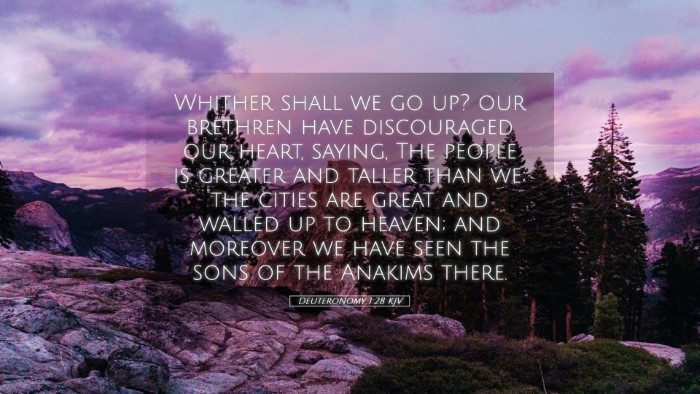Commentary on Deuteronomy 1:28
Verse Text: "Whither shall we go up? Our brethren have discouraged our heart, saying, The people is greater and taller than we; the cities are great and walled up to heaven; and moreover we have seen the sons of the Anakims there."
Introduction
The inquiry posed in Deuteronomy 1:28 encapsulates a pivotal moment in the history of Israel, illustrating the tension between divine promise and human apprehension. This verse forms part of Moses' address to the Israelites, recalling their previous reluctance to enter the Promised Land due to fear and discouragement brought on by their brethren's negative report. This commentary synthesizes insights from eminent public domain sources to uncover the theological, historical, and practical implications of the text.
The Context of Deuteronomy
The book of Deuteronomy stands as a foundational text for understanding Israel’s covenant relationship with God. According to Matthew Henry, this book is essentially a series of sermons preached by Moses, aiming to prepare the Israelites for their imminent entry into Canaan. The events leading to Deuteronomy 1:28 are crucial, as they reflect Israel's struggle with faith and obedience in light of God’s promises.
The Meaning of the Question
The question "Whither shall we go up?" reveals not just confusion but profound anxiety regarding their ability to confront the challenges that lie ahead. Albert Barnes emphasizes that this inquiry reflects a lack of faith, suggesting the Israelites' dependency on visible circumstances rather than the invisible assurance of God's presence. The anticipatory dread overcomes their zeal to seize the land promised to them.
The Brethren’s Influence
In the verse, the term "our brethren" refers to the ten spies who returned with a report that instilled fear within the people (Numbers 13). Adam Clarke notes that this illustrates a critical aspect of community and leadership in faith; namely, the impact that leaders' testimonies have on the collective mindset of a congregation. The spies’ negative report led to disheartenment, emphasizing the necessity of responsible and faith-based leadership.
The Nature of the Fear
The fear expressed in this verse underscores a significant theme within the biblical narrative: the tension between God's promises and human perception of reality. The Israelites go on to describe the inhabitants of the land as "greater and taller," invoking imagery that suggests insurmountable odds. Matthew Henry suggests that this description can be seen as both literal and metaphorical; the physical stature of the Anakim represents not only their might but also the overwhelming nature of challenges that believers might face.
The Cities Walled to Heaven
Further, the reference to "the cities are great and walled up to heaven" evokes a sense of immovability and formidable opposition. Albert Barnes points out that this exaggerated portrayal may stem from fear itself, which often distorts reality. The language here invites a deeper reflection on how fear can warp perceptions of our challenges, making them seem greater than the God who promises to deliver us.
The Sons of Anak
The mention of "the sons of the Anakims" serves to highlight the nature of the opposition that the Israelites fear. In biblical literature, the Anakim are often associated with giants or formidable foes, a motif that can be traced throughout Scripture as representative of overwhelming challenges faced by God's people. Adam Clarke elucidates that these figures serve as a reminder that while the challenges may be significant, God's power and covenant prevail over such fears. The emphasis on "seen" points to how personal experience shapes our understanding of God’s capabilities; those who maintain faith see obstacles differently.
Theological Implications
From a theological standpoint, this verse calls for reflection on the doctrine of faith versus fear. Matthew Henry asserts that this is a stark reminder of humanity’s tendency towards doubt, especially when faced with daunting tasks. The Israelites’ fear leads them to question their calling, which brings forth critical questions for today’s believers: how often do we allow fear to dictate our obedience to God’s commands?
The Call for Courage
As leaders and followers in faith communities, this text invites an exhortation toward courage and trust in God’s promises. The Apostle Paul echoes this in Romans 1:17, proclaiming that "the just shall live by faith." The narrative encourages those in ministry to foster an environment where faith is nurtured, reminding congregants that God equips those He calls, regardless of their circumstance. Albert Barnes remarks that this moment serves as a lesson on the importance of endurance and trust in God's faithfulness amidst adversity.
Practical Applications
- Faith over Fear: Encouraging believers to confront their fears with the truth of Scripture and God’s promises.
- Community Impact: Recognizing the influence of leadership and community on individual faith journeys; leaders should cultivate encouragement rather than discouragement.
- Perspective in Trials: Teaching congregants to view challenges through the lens of God’s faithfulness rather than overwhelming circumstances.
Conclusion
Deuteronomy 1:28 serves as a timeless reflection on the struggle between faith and fear, inviting all who follow Christ to engage with the promises of God unflinchingly. As Moses recounts the journey of Israel, we are reminded of the importance of faith-filled community, the dangers of discouragement, and the power of viewed challenges in the light of God’s unwavering faithfulness. This passage, rich with theological insight and practical wisdom, continues to speak into the lives of pastors, leaders, and believers today, urging them to rise above fear to claim the promises set before them.


